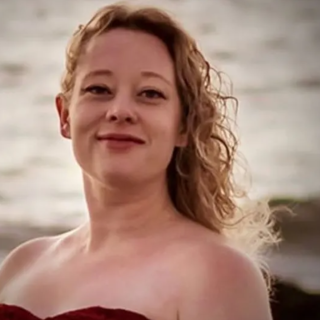Advertisement
JP Marat: What is your name?
Mary: My name is Mary Yoder. I’m a registered Nurse in Columbus, Ohio.
Tell us about yourself
I grew up in a big Mennonite family. I’m a member of Christian Peacemaker Teams and Jewish Voice for Peace. Both groups advocate for human rights for the Palestinian people.
Don’t Israelis and Palestinians all want to live in peace?
Yes! I’ve met many good people on both sides who want to live in peace and harmony but Israeli government policy makes that impossible.
What attracted you to Christian Peacemaker Teams (CPT)?
I’ve always been interested in communal living. I like getting to know people on a deeper level than just being casual friends at work. CPT empowered me to live that way while working for Peace and Justice in Palestine. I attended preliminary training in Chicago for four weeks then traveled to Palestine for three months. During our time in Chicago we studied advocacy, after trauma care, acting as a human shield, lobbying local government organizations, nonviolent resistance, etc.
Hmmm. Sounds to me like you were preparing for trouble.
Actually one of CBT’s slogans is “Getting In the Way!”
Get in the way of what?
Well many things. 1. Getting in the way of the Israeli military demolishing Palestinian homes or tear gassing children walking to school in defiance of a curfew; 2. Getting in the way of Israeli settlers seizing Palestinian owned land; 3. Making a presence known at the many checkpoints that scar the occupied territories.
West Bank Checkpoints
Let’s start with Checkpoints. Tell me about them.
The West Bank is approximately 90 miles long and 35 miles wide. There are about 600 roadblocks and checkpoints. This like driving to Cincinnati and being forced to stop 600 times. For Americans, this is completely unimaginable.
How long does one need to wait at the each checkpoint?
It is unpredictable by design. Some checkpoints are fairly quick. Others require a one to eight hour wait. Others are closed on and off, so you can’t get through at all. The situation changes constantly.
What if you are a peaceful Palestinian who has never been ‘“in trouble.” Can you obtain a pass to get through checkpoints faster?
No. The checkpoints are based on race and nationality not on whether you are suspected of having committed a crime. The overwhelming majority of the Palestinian people have never been “in trouble.”
Do Israelis and western tourists also need to wait at these checkpoints?
Israelis have different color license plates. They are quickly waved through. Likewise western tourists can pass without delay.
What if you are going to work? Can you get a pass from your employer or the Israeli Army to pass through the checkpoint unimpeded?
Are you kidding?! No. There is no "fast pass lane" for Palestinians.
What if you have a sick child or elderly parent? Is there an exception for that?
That is the scariest part of all. Pregnant women, sick children and adults perish at checkpoints. In period between 2000-2007, thirty-five babies died.
Do you have personal knowledge of this occurring?
Unfortunately, yes. My best friend from Hebron was held at a checkpoint. Despite pleas for her obvious feverish infant she was forced to wait. When she was finally allowed to pass and go to hospital the infant had gotten worse and died. The doctor attending the child wrote a note detailing that the child’s death was the result of delays at the checkpoint.
Was she a terrorist? Did she have affiliations with terrorist organizations?
No she was a loving Palestinian mother with a sick child. She was educated in Jordan and spoke perfect English. She was a kind woman who doted on her husband and loved her children.
Did she have a police record? Was she under suspicion of any crimes?
Absolutely not. She was simply a Palestinian woman with a sick child.
Why don’t we ever hear about this type of thing on US news?
There is an obvious and unfair bias against Palestinians in the United States media and in Congress.
What is the purpose of these checkpoints?
The Israeli military says they are for security but this is highly questionable. They are put into areas to facilitate Israeli settlement expansion. The intent is to make life extremely difficult for local Palestinians so that they abandon their homes and move away. When that happens they can be taken over by Israeli settlers or demolished. From 2014-2015 the Knesset (Israeli Parliament) issued permission to confiscate 7,000 acres of Palestinian land.
Home Demolitions and Land Grabs
Under what circumstances might the Israeli army demolish a Palestinian home?
Palestinians who have committed crimes against Israeli may have their homes demolished. Homes may also be demolished if they are near a place where Israel wants to build a settlement.
What if other family members are living here?
Typically 10-20 family members are displaced. Dynamite is often used which cracks the foundations of neighboring homes making them uninhabitable as well. No compensation is provided for homes that are demolished or rendered unlivable.
Is this practice of home demolition used against Israelis who are convicted of terrorist offenses against Palestinians?
No. In the occupied territories (West Bank and Gaza) all Palestinians live under Israeli military law. Jewish Israelis have full human rights and live under Israeli civilian law.
Do you have personal knowledge of Palestinian land grabs?
Yes. I was present for many home demolitions. Typically neighbors come to watch. They hold each other, pray and cry. Little time is given to allow the family opportunity to move out their belongings. Often life savings in the form of a home and furnishings are destroyed within minutes. Afterwards the family will sometimes live in a tent near the remains of the wreckage or move away (which is often the purpose of the home demolition).
Do you feel this is a problem with a few bad Israeli officers?
Policy for Palestinian land confiscation is passed by the Knesset and enforced by the Israeli ilitary and the Settler Movement.
This sounds like extreme violence against Palestinians civilians.
Yes. For years, the United Nations has passed resolutions condemning Israeli atrocities. Most Americans may or may not know that the World Court, The United Nations, [and world opinion] has condemned the Wall [separating Israeli’s and Palestinians] and the occupation of West Bank and Gaza.
What do “average” Israeli's say about this?
They are very divided. Religious settlers support many of the crimes committed to obtain West Bank land. Some are economic settlers (from the United States or elsewhere) attracted by financial opportunities. However there is a growing movement of Israelis who strongly oppose these policies. For instance Arik Escherman (Rabbis for Human Rights) has been jailed numerous time for standing up for Palestinians threatened with home demolition. There are a number of Israeli groups that advocate for Palestinian human rights.
What other personal experiences have you had with land confiscation?
A Jewish settler was demolishing a Palestinian vineyard near Hebron. I was taking photos of his bulldozer for Christian Peacemaker Teams. The settler jumped off the bulldozer with an automatic weapon. He tore the camera away from me and threw me to the ground, resulting in two herniated neck disks which required surgery.
Were you afraid for your life?
It all happened very fast.
Did the US government step in and protest on your behalf?
No they did not. The US Embassy and State Department acts respectfully toward Christian Peacemaker Teams but US government policy provides billions of dollars of direct and indirect aid to Israel. They are largely non critical of human rights abuses against the Palestinian people.
While living in Palestine, did you ever feel that you were in danger from Arabs?
No.
Did you ever feel in danger when dealing with Israeli settlers or Israeli military?
Yes. In addition to incident I mentioned above, I was placed in a Palestinian home to act as a human shield to guard them against attacks from Israeli settlers. Typically in settler attacks, homes are surrounded. Windows are broken. Cars are set on fire. Houses are ransacked. In parts of Hebron, if a Palestinian home is left unoccupied for even a short period of time, Jewish Settlers may move in and refuse to leave. They are often supported by the Israeli military.
How can Americans support peace and justice issues in Israel and Palestine?
First become knowledgeable in understanding the current situation. Check out both neutral information sources like the United Nations (Humanitarian Bulletin Monthly Report for the Occupied Territories) http://www.ochaopt.org/as well as websites run by activist groups like Christian Peacemaker Team and Jewish Voice for Peace.
What is the Boycott, Divestment & Sanction Movement (BDS)?
In 2009 Palestinian Christians wrote a call to action entitled the Kairos Document (http://www.kairospalestine.ps/content/kairos-document) outlining their extreme suffering at the hands of Israeli Government. It was modeled after a similar document penned in South Africa during the apartheid regime and was one of several seminal events that lead to the worldwide movement to Boycott, Divest and Sanction the South African government.
Today’s Boycott, Divestment & Sanction (BDS) movement calls for a nonviolent response to the Israeli attacks against the Palestinian people. It has grown from a small idea tossed about in online chat rooms to an International movement supported many churches, faiths, universities, groups and individuals. Essentially BDS means: a) Boycott Israeli Products made in the West Bank; b) Divest from Israel (and Israeli financial institutions); c) Apply international sanctions to Israeli until it supports human rights for the Palestinians.
It is interesting to note that in October 2015 the Ohio legislature quietly passed a bill disallowing financial assistance (or state contracts) to be awarded to institutions and/or entities backing the BDS movement.
Your time in Palestine was challenging. Was it also enjoyable?
It was. We loved to go to open air markets and mix with friendly people we met there. I spent a lot of time walking (instead of driving in a car) which was healthy. The local kids were great. They’d yell your name loudly whenever they saw you on the street. Also the food was wonderful: fresh humus and flatbread, tasty vegetables, wonderful tea. It was also terrific working with the Israeli activists who joined us in our fight for human rights for the Palestinians. Some have moved from a secular to a religious standpoint, strongly asserting that the ancient Jewish prophets affirm the dignity and humanity of all races.
Are you hopeful for the future?
Yes. The trends for social justice are improving. We must all do our part regardless of where we live in the world.
What are you doing now?
I’m promoting a film called “Two Blue Lines,” available at http://www.ameu.org/. It documents a lot of the things we’ve discussed today. Please contact me (or email JP Marat@BigBarkingDog.com) for more information on scheduling a viewing. Consider getting involved with Christian Peacemaker Teams, http://www.cpt.org/or Jewish Voice for Peace https://jewishvoiceforpeace.org/ or similar organizations.



